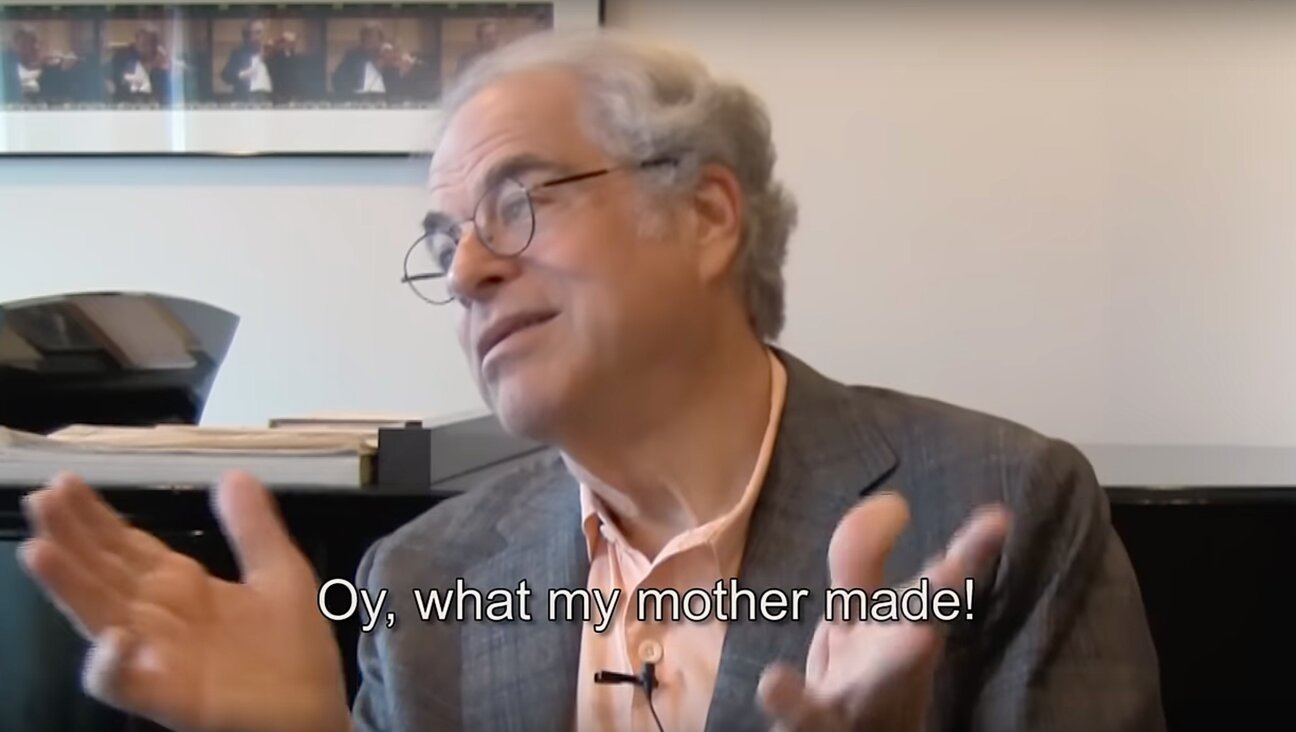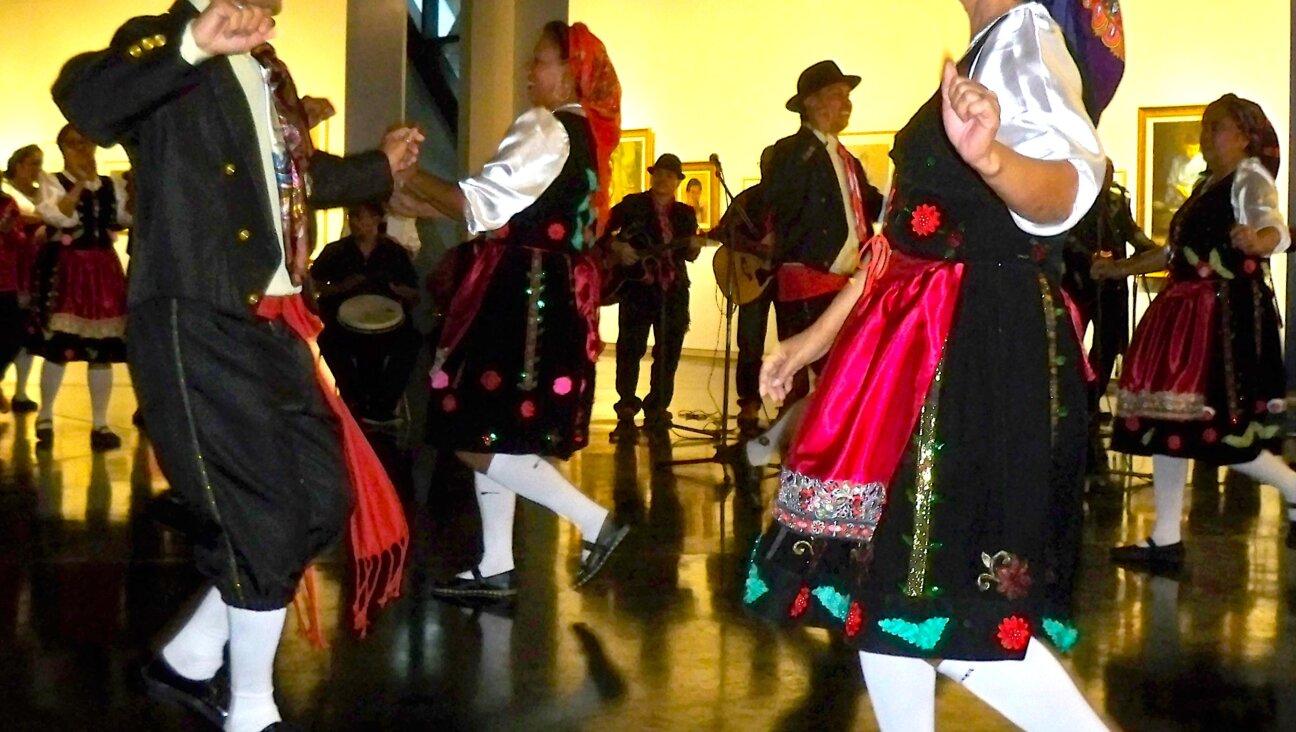WATCH: The Forverts premieres Yiddish version of Woody Guthrie’s classic, ‘This Land is Your Land’

Image by Daniel Kahn
Read this article in Yiddish
The Forverts has released a Yiddish rendition of folksinger Woody Guthrie’s classic song, “This Land is Your Land.”
The music video, which features an international group of Yiddish singers and klezmer musicians, was produced by punk-klezmer musician Daniel Kahn.
While a Yiddish version of “This Land is Your Land” may at first seem far afield from the “dust-bowl troubadour’s” life and work, Guthrie, who was not Jewish, actually had deep personal and artistic connections to Yiddish and Jewish culture. His mother-in-law was the acclaimed Yiddish poet Aliza Greenblatt and the two often performed their works for each other.
Join Forward editor-in-chief Jodi Rudoren for a talk with “This Land is Your Land” translator Daniel Kahn and other Yiddish singers, Thursday, March 11 2 p.m ET. Register here.
With Greenblatt’s input, Guthrie wrote nearly a dozen songs about Hanukkah and other Jewish themes at the suggestion of Moses Asch, the owner of his record label. Asch was the son of the well-known Yiddish author and playwright, Sholem Asch.
Linda Gritz, a stalwart of Boston’s Yiddish cultural scene, took the initial stab at translating the American classic.
The current version evolved from a songwriting workshop held as part of Yiddish New York in December, where Kahn and Yiddish singer/songwriter Josh Waletzky worked on it together with her.
During the workshop, Waletzky asked: “Why create a Yiddish version?” Gritz realized that although her translation project was motivated by her “Jewish values of justice, rooted in radical Yiddishkayt,” her text had no explicit Jewish references. She then changed Guthrie’s original “New York Island” to “Ellis Island” to honor immigrants to this country, including her own forbearers.
The Yiddish lyrics acquired further Jewish resonance when Kahn substituted Guthrie’s line about “diamond deserts” with the verse, “I wandered into a free country/out of the desert/as though from Egypt/looking for a New Jerusalem.”
“It puts a Jewish spin on (the verse), while preserving its universal yearning for freedom,” Gritz said.
Few people know that Guthrie’s “This Land is Your Land” was first written as a critique of Irving Berlin’s “God Bless America,” which the iconic folksinger felt was blindly patriotic and unduly overlooked the flaws in American society. Ironically enough, as Kahn explained, many singers today avoid “This Land is Your Land” because they misinterpret it as being overly patriotic.
“Only half of Woody’s song is generally well-known,” Gritz said. “The verses about trespassing, hunger, and defiance have often been deliberately omitted from the great American songbook. We committed to crafting a Yiddish version that reflects all of Woody’s verses, that reflects the unfulfilled promise of America.”
After Yiddish New York, Gritz and Kahn continued refining the translation over Zoom. Once the text was set, Kahn recruited Yiddish singers and klezmer musicians in Germany, the United States and Scotland to record it, then pieced the recordings together, to create the video.
“It was a real labor of love,” noted Kahn.
The video was released this week, to coincide with the song’s 81st anniversary. Guthrie penned it on February 23, 1940.
“This Land is Your Land” is far from Kahn’s first foray into translating popular songs into Yiddish. The Detroit-born, Berlin-based musician is renowned for his Yiddish versions of North-American classics like Leonard Cohen’s “Hallelujah” and Bob Dylan’s “I Shall Be Released”, both of which were released by the Forverts.
Besides Gritz and Kahn, the new recording features singers Sarah Gordon, Lorin Sklamberg, Michael Alpert, Sveta Kundish, Eva Lapsker and the accordionist Patrick Farrell.
Lorin Sklamberg, the lead singer of the Klezmatics, has previously helped bring Guthrie’s Jewish connections to the fore. In 2006 Sklamberg and the Klezmatics released the album, “Woody Guthrie’s Happy Joyous Hanukkah,” featuring seven Hanukkah songs penned by the Oklahoma-born folk legend. That same year the band won the Grammy for Best Contemporary World Music Album for “Wonder Wheel,” which set a dozen previously unsung Guthrie songs to music.

























